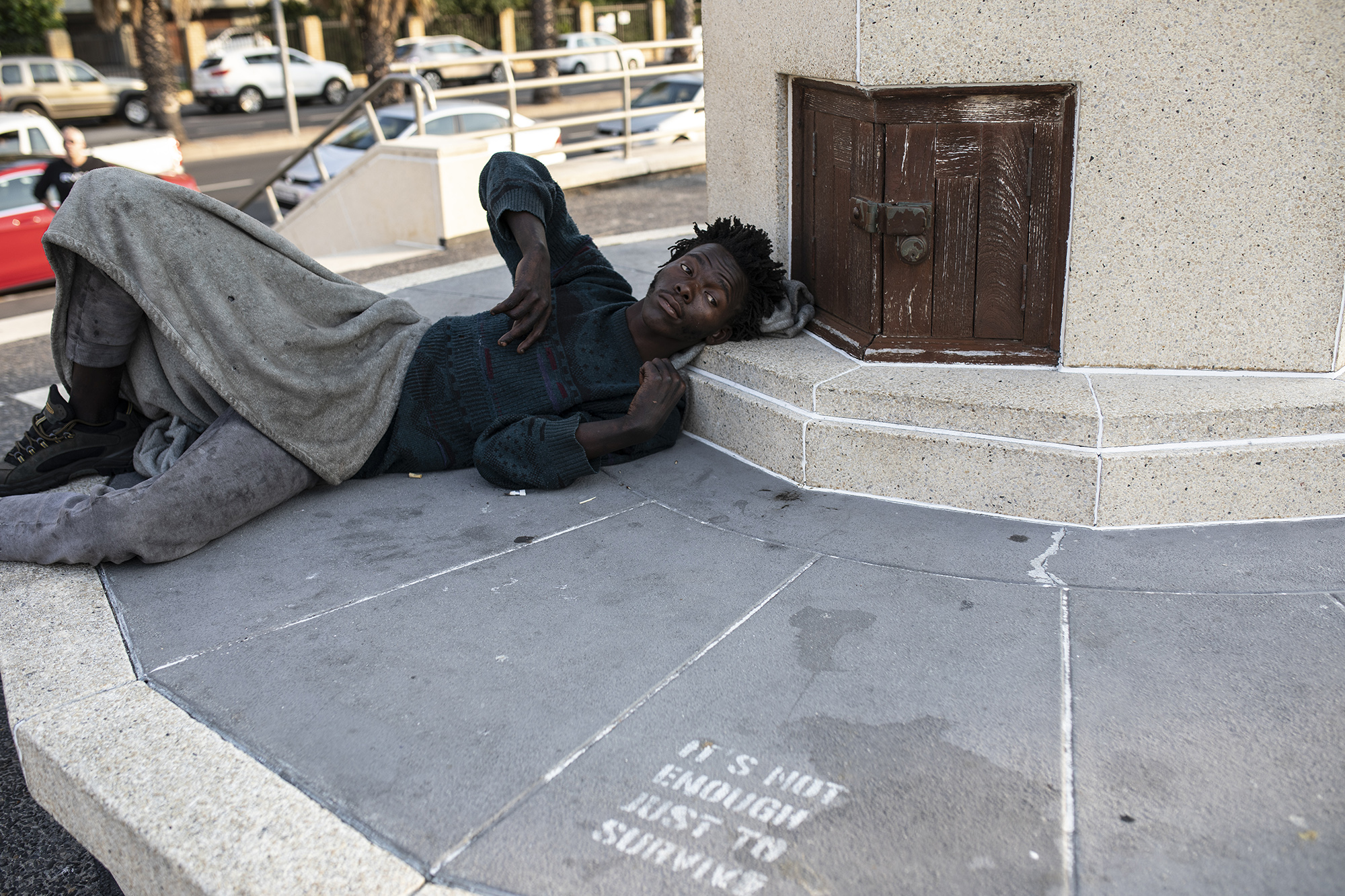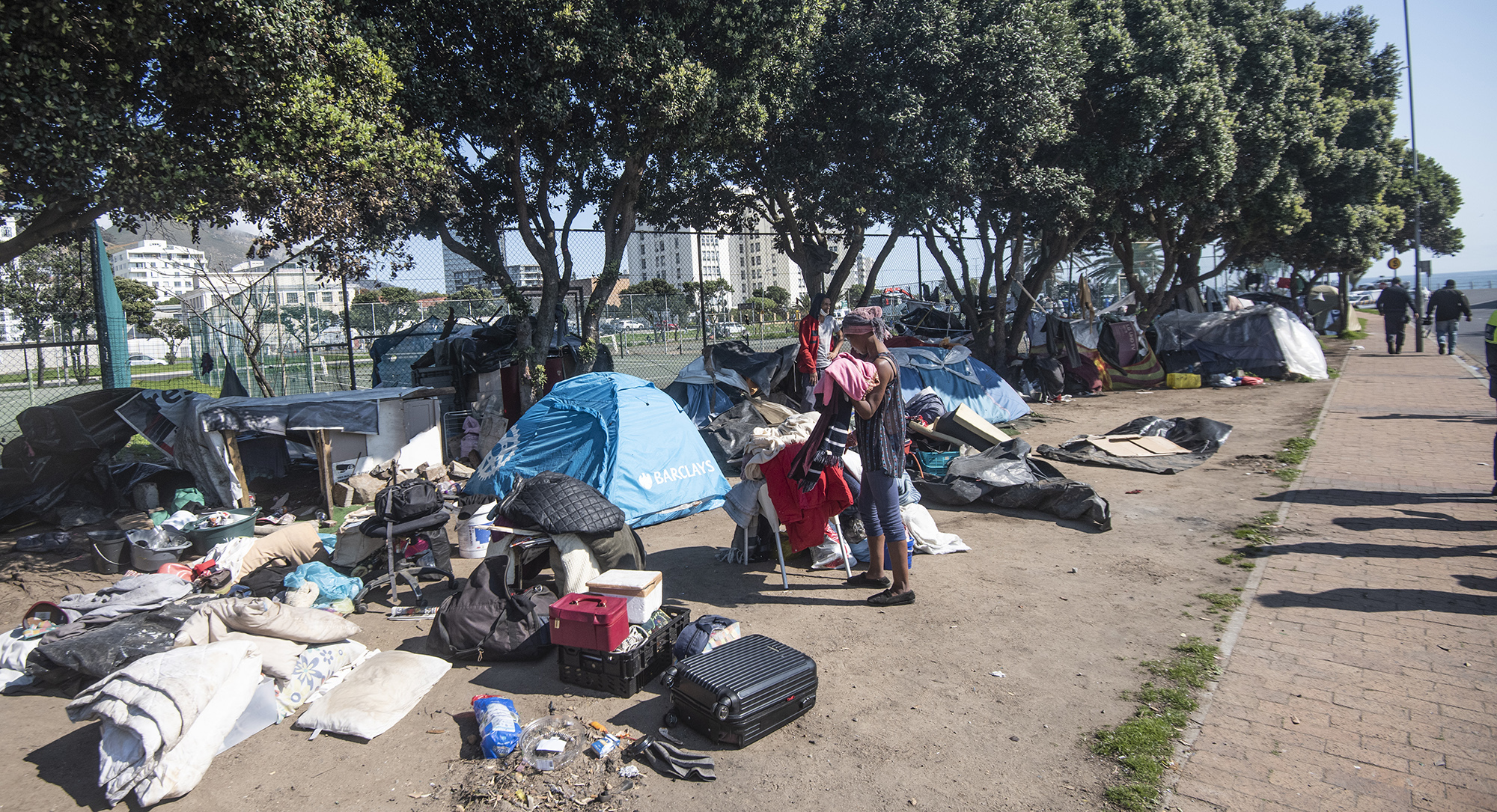Homelessness is on the rise in cities across the world. From Cape Town to Calgary and Los Angeles to London, increasing numbers of people are being forced to live in public places. The combined impact of the Covid-19 pandemic, poor economic growth, the fallout from the war in Ukraine and persistently exclusive housing markets are pushing more and more people into housing precarity wherever you look.
The structural drivers of homelessness are of course different in each context, but the general trend is that families are struggling to make ends meet and that neither private property markets nor state housing provision have managed to provide adequate access to shelter. According to the City of Cape Town itself, only one-quarter of all households in Cape Town earn enough to afford an entry-level home. There is clearly a profound and irrefutable mismatch between what people earn and how much it costs to access housing, which partially explains why there are more than 350,000 people registered on the housing waiting list in Cape Town and why roughly 20% of all families in the city live in informal settlements.
A small but organised group of residents and business owners in Muizenberg are mobilsing themselves to block the development of a safe space for the homeless in their neighbourhood. However, by failing to offer a workable alternative, they run the risk of entrenching a situation that does a disservice to the homeless community and surrounding homeowners alike.
Homelessness is not an issue that will simply disappear, nor can it be sustainably addressed by the punitive approach that has historically been deployed in Cape Town of aggressively confiscating possessions, issuing fines and moving people from one neighbourhood to the next. Instead, we need to expand access to adequate housing and strengthen social development programmes. It is crucial that people in neighbourhoods like Muizenberg lend their support to initiatives like the Muizenberg Improvement District’s (MID) safe space for the homeless — if they don’t, the loud voices of a minority group will prevent any meaningful solution from taking root, thus entrenching a situation that does not serve Muizenberg’s homeless community or surrounding homeowners and businesses.
The MID has been attempting to set up a safe space for the homeless in Muizenberg for almost three years. It has raised the necessary capital and operational funding, and now just needs community buy-in and access to public land to bring the project to fruition. The City of Cape Town recently tentatively agreed to provide a piece of municipal land in the neighbourhood for the purposes of a safe space after a long and frustrating battle. While there was initially strong community support for the project, long delays in getting access to City land have created uncertainty and division, and opened space for a small group of residents who are opposed to the safe space to drum up fear and mobilise resistance. Interestingly, it is broadly the same group of people who complain the most about homelessness that opposes the plans for a safe space most vociferously, thus preventing any real progress or solution from taking root. Unfortunately, some surrounding businesses and homeowners who care for their neighbourhood and have invested a significant amount of energy and money into it are falling into this same trap.
Visit Daily Maverick's home page for more news, analysis and investigations
We need those who recognise the importance of a more dignified and sustainable solution to speak to their neighbours and friends, and to offer their support to people within the MID who are pushing for the safe space’s establishment. Almost any site that is proposed will generate some resistance, but it would be a great pity to let perfect be the enemy of good. Getting access to funding, City land and reputable partners is not easy, and if the proposed location is rejected then it may well be many years before the necessary factors for establishing a successful safe space come together again. Even if residents identify a better site, such as a nearby vacant building, there is no guarantee that it will be used for a safe space and the process of trying to secure it for this purpose is likely to lead to even bigger delays, and potentially even cancellation.
Not all safe spaces are the same — those that impose stringent rules, separate families and force people to use their services under duress are much less likely to be effective. It is no coincidence that the organisations that have been working on creating sustainable pathways out of homelessness for the longest period avoid the above approach. Encouragingly, two of the most respected and experienced support organisations, UTurn and MES, would be responsible for running the Muizenberg safe space. MES in particular has worked with people experiencing homelessness in Muizenberg for many years, which bodes well for securing the buy-in that is absolutely crucial to the success of this type of intervention. The safe space would not only provide a dignified place to sleep, wash and store possessions, but it would also provide services relating to job readiness, assistance with addiction, and other important psycho-social support. Getting access to these services can be the first step in getting people into more stable and permanent forms of housing. Many people experiencing homelessness voluntarily use similar services elsewhere in Cape Town, and it is undeniable that these services offer a better alternative than the current situation.
 According to a costing study by U-Turn Homeless Ministries in 2020, there are more than 14,000 homeless people in Cape Town and there has been growing homelessness in Sea Point. There has also been an increase in hostility towards the homeless in recent years with feeding schemes in the area threatened and harassed. (Photo: Leila Dougan)
According to a costing study by U-Turn Homeless Ministries in 2020, there are more than 14,000 homeless people in Cape Town and there has been growing homelessness in Sea Point. There has also been an increase in hostility towards the homeless in recent years with feeding schemes in the area threatened and harassed. (Photo: Leila Dougan)
However, what is also important for Muizenberg’s residents to understand is that this alternative is not only better for people experiencing homelessness, but also better for surrounding homeowners and businesses. Many of the complaints against homelessness in Muizenberg relate to the fact that people sleep on sidewalks and in public spaces, thus making them harder to navigate. Because public toilets in Muizenberg are locked at night, people have little choice but to relieve themselves in public areas, which causes urban management issues and quite understandably distresses other neighbourhood residents. Another frequent complaint is that people find makeshift sleeping structures in public areas upsetting. The solution to these issues is not to bury one’s head in the sand or fruitlessly call for people to be moved along, but rather to pursue alternative approaches that provide people experiencing homelessness with different, more dignified options for finding shelter and going about their daily lives. One such alternative is the type of safe space and associated services offered by the likes of UTurn and MES.
There is a golden opportunity for the residents of Muizenberg to get behind a solution that will have a meaningful positive impact on everyone involved. However, realising this opportunity will depend on community support and input, as well as a much more responsive and inclusive approach from the City. Despite many public claims by the Mayor and other local politicians that the City is taking a more caring and pragmatic approach to homelessness and that it wants to work with active and committed residents, providing land for the Muizenberg safe space has been far too slow and the process has been fraught with tension and conflict rather than open cooperation and communication. There is still a chance to set an empowering example for other parts of Cape Town, and this chance should be grabbed with both hands by residents and the City alike. DM/MC
Nick Budlender is a housing policy researcher at the activist organisation Ndifuna Ukwazi.




 According to a costing study by U-Turn Homeless Ministries in 2020, there are more than 14,000 homeless people in Cape Town and there has been growing homelessness in Sea Point. There has also been an increase in hostility towards the homeless in recent years with feeding schemes in the area threatened and harassed. (Photo: Leila Dougan)
According to a costing study by U-Turn Homeless Ministries in 2020, there are more than 14,000 homeless people in Cape Town and there has been growing homelessness in Sea Point. There has also been an increase in hostility towards the homeless in recent years with feeding schemes in the area threatened and harassed. (Photo: Leila Dougan)